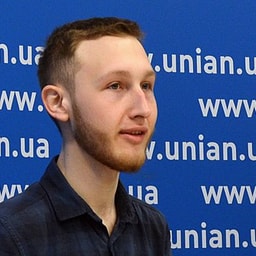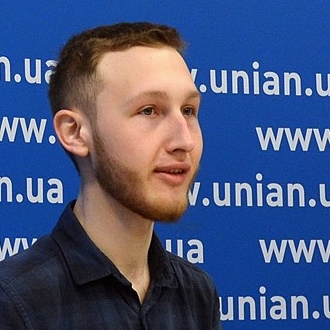Vostok SOS helps evacuate over 23,000 people fleeing Russia's war, continues its mission

Editor’s Note: This story about the Vostok SOS nonprofit was sponsored by the Foundation International Communications Hub and the Comms Hub Ukraine. Vostok SOS provides humanitarian aid to people affected by Russia’s war and helps evacuate civilians from front-line settlements. If you would like to support their efforts, donate here.

Iryna Yakovleva, a retired 60-year-old medical worker, faced one of the biggest challenges of her life when she was diagnosed with breast cancer in February. Then it got even more difficult.
Based in her native Kostiantynivka, Donetsk Oblast, Yakovleva had just started treatment in a larger nearby city called Kramatorsk, when Russia began its full-scale invasion of Ukraine on Feb. 24. The escalated hostilities in eastern Ukraine forced local doctors to flee Kramatorsk, further away from the front lines, leaving many residents with little to no medical care.
To be able to continue receiving vital medical assistance, Yakovleva evacuated as well. She ended up in Dnipro, a regional capital in central Ukraine, where many internally displaced Ukrainians from the east found refuge.
Yakovleva came along with two family members, both fully dependent on her support: an elderly mother, who could not walk or speak, and an adult son, who has a developmental disability. Her mother died soon after relocation.
More than 7 million people have been internally displaced within Ukraine since Feb. 24. Evacuating from regions with heavy hostilities such as Donetsk Oblast is dangerous or even deadly as Russian forces shell evacuation convoys and civilians trying to escape on their own.
The chances of Yakovleva’s safe escape would have been much smaller if it wasn’t for the Vostok SOS non-governmental organization.
Vostok SOS has been helping Ukrainians affected by Russia’s war in Donbas, the region comprising Donetsk and Luhansk oblasts, since 2014, when Moscow first invaded the east of Ukraine. But today, with eastern regions under unprecedented fire, the nonprofit’s mission is as essential as ever.
The organization has already helped thousands of Ukrainians, including those with disabilities, to relocate from the east. It also helps people find shelter in safer regions, distributes humanitarian aid, provides psychological and legal support, and documents Russia’s war crimes.
The charity’s team now includes over 200 people, working together to relieve the struggles of many Ukrainians.
On June 29, the Kyiv Independent spent a day following the efforts of Vostok SOS in Dnipro.
How it started
Vostok SOS was founded in 2014 by pro-democracy activists from Luhansk Oblast when Russia invaded Ukraine’s east and occupied and illegally annexed the Crimean Peninsula.
The organization’s mission was to provide “comprehensive assistance to conflict-affected persons and IDPs (internally displaced persons), promoting democratic transformation and human rights values in Ukraine.”
In its first years, Vostok SOS focused on providing humanitarian help to residents of war-affected eastern regions. The name “Vostok” means “east” in Russian, a commonly spoken language in the east of Ukraine. They also provided legal assistance and psychological support, as well as monitored the situation, and documented human rights violations.

The organization’s main hubs were based in Kyiv and Sievierodonetsk, the temporary regional capital for Luhansk Oblast after the city of Luhansk was occupied by Russia.
The nonprofit’s communications manager Kateryna Hrapovych says that in 2016, when hostilities slowed down, Vostok SOS pivoted to long-term development programs such as educational and cultural projects in front-line towns.
But in 2022, Russia’s all-out invasion forced the organization to mainly focus on supporting people directly affected by the war.
After Russia’s unsuccessful offensives aimed at seizing Kyiv, the Kremlin was forced to retreat from northern Ukraine, shifting its focus to the east and making it the main epicenter of the war. Russia has made slow but steady advances in the region, having now occupied virtually all of Luhansk Oblast and about half of Donetsk Oblast.
With indiscriminate shelling that has leveled some cities in the east to the ground and a catastrophic humanitarian situation, local civilians have borne the heaviest burden of the war. Vostok SOS is on a mission to lighten this weight – such as by providing humanitarian assistance.
Distributing humanitarian help
With Sievierodonetsk now occupied by Russia, the nonprofit’s hubs relocated to Dnipro and the city of Uzhhorod in the west of Ukraine.
As we arrive at Vostok SOS’s hub in Dnipro on June 29, its employees and volunteers are preparing to distribute humanitarian help. People have to sign up for it in advance.
On this particular day, some 100 people are on the list – mostly those who evacuated from front-line settlements in the east and occupied southern regions. Locals who have suffered from the war are also eligible to get help.
Among the people standing in line is Tetiana, 36, who refused to give her last name due to security concerns. As she gets help from Vostok SOS, her five-year-old son Dania is playing with the volunteers.
Tetiana and Dania fled from Kharkiv, Ukraine’s second-largest city located in the northeast that’s been heavily bombarded by Russian invaders.
“We spent almost a month hiding in a basement,” Tetiana says, as she recalls the beginning of the all-out war, “(often) without running water and electricity.”
“Rockets and planes were flying above us every day,” she adds.
According to Vostok SOS, since February they have spent over $1 million on humanitarian help and distributed some 3,000 tons of food and hygiene packages. Sometimes the food is supplied by the organization’s partners, often it’s directly purchased by Vostok SOS with fundraised money.
As the world’s attention steadily turns away from Ukraine, financial support has also gone down, says Hrapovych. But as the humanitarian situation in eastern Ukraine deteriorates, the need for donations from the international community is as high as ever, she said.
Documenting Russian war crimes
As people are standing in line to receive humanitarian assistance, they also have a chance to tell their story – and help prosecute potential war crimes.
Oleksandr Leonov left the city of Mariupol in the first days of Russia’s full-scale invasion, just a day before leaving by train was no longer possible. Mariupol is now occupied by Russia and the city witnessed some of the most ruthless Russian bombardment. According to the Donetsk Oblast Administration, over 22,000 people may have been killed in Mariupol.
Today, Leonov, 21, works at Vostok SOS documenting war crimes committed by Russian invaders. Along with his colleague Mykyta Biliakov, 25, they speak with people who have fled occupied territories or places with active hostilities to record actions that could be useful in prosecuting Russian occupiers.
According to employees, displaced civilians tell them terrifying stories about witnessing the deaths of their neighbors and extrajudicial killings.
Most people, however, don’t want to talk: They are either afraid of retribution for speaking out or, often falsely, assume they have nothing to say.
“A lot of people think they didn't see anything (important), but when we start talking, we learn that they know (a lot) – what was shelled, when, how many people were affected,” Biliakov says.
According to Hrapovych, Vostok SOS has so far recorded 78 instances of war crimes allegedly committed by Russian troops since Feb. 24. The organization sends the documentation to Ukrainian law enforcement agencies and international organizations for further investigation.
Evacuating people from east
Before people even have a chance to tell their story, they need to be evacuated from frontline regions – another area of Vostok SOS’ work.
Dnipro has become a major hub for internally displaced persons from the east due to its location – it’s one of the closest regional capitals to the frontline that is under Ukrainian control and which has been relatively spared from Russian attacks.
Once a day, an evacuation train arrives from Pokrovsk, a city in Donetsk Oblast, bringing people from various Donbas settlements who have managed to flee. The train’s final destination is the western city of Lviv, 1,000 kilometers away, but many people get off in Dnipro – either to take a break before the rest of the trip or because they don’t want to travel far from their native settlements.
Vostok SOS helps bring people to the train in Pokrovsk and meets them at the railway station in Dnipro. If needed, the nonprofit helps evacuees find shelter.
On June 29, the organization’s members are meeting and transferring three people with reduced mobility who have arrived in Dnipro. One of them is 73-year-old Mykola Ivanovych, who evacuated from Kostiantynivka, a city in Donetsk Oblast, located about 50 kilometers from the front line. The situation in his city is “chaotic,” he says.
“I don’t know if I will still have a home when I come back,” he says.
Yaroslav Korniienko, Vostok SOS’s local evacuation coordinator, says they now help approximately five to six people daily in Dnipro, though the number was higher in May and June when hostilities intensified and there were large numbers of people evacuating from Ukraine’s east.
In total, the nonprofit estimates they have helped evacuate over 23,500 people, including 1,100 people with limited mobility, as of late June.
Many of the people with limited mobility who evacuate to Dnipro are accommodated in a local medical center thanks to Vostok SOS.
Among them is Kostiantynivka resident Yakovleva, who continues to battle cancer, now undergoing treatment in Dnipro.
Yakovleva wants to come back to Kostiantynivka after the treatment is over – and hopes her home will still stand when she returns.
“This bastard (Russian dictator Vladimir) Putin has ruined my life… so many lives,” she says.
It is unclear if Yakovleva will ever be able to return to her native Kostiantynivka, but for now, she is taken care of thanks to the efforts of Vostok SOS.














































